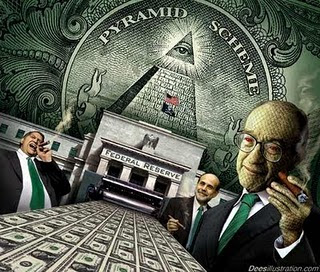 |
| Dees Illustration |
An Address to the International UFO Congress
Fort McDowell Resort, Scottsdale, Arizona
Saturday, February 26, 2011
by Hon. Paul Hellyer, P.C.
Former Canadian Minister of National Defence
The world financial system is a total fraud. It is one gargantuan Ponzi scheme, no better than the one Bernie Madoff used to swindle his friends and neighbors, and thousands of times worse if you add up the total number of victims it has ripped off over countless generations.
The principal difference between the two schemes is that Madoff was acting outside the law while the international banking cartel has persuaded generation after generation of monarchs, presidents and prime ministers to provide legislative protection for their larceny.
The banks Ponzi scheme is alarmingly simple. They lend the same money to several people or institutions at the same time and collect interest on it from each. What the banks really lend, however, is their credit, and what they take back in compensation for that privilege is a debt that must be repaid with interest.
The number of times they lend the same money is called leverage. The practice is as old as the hills but for our purposes we can start with the goldsmiths of Lombard Street in London, England, who accepted deposits for which they issued certificates redeemable on demand. They paid their depositors a nominal interest rate on the understanding that they could lend the money to their customers at higher interest rates. They soon found that they could lend more than they had in their vaults because only a few depositors came in to redeem their gold or silver at any one time. It was a scam. It was illegal. Nevertheless they got away with it for a long while and the scam was legitimized when the Bank of England was chartered to help King William finance his war. Rich people subscribed £1,200,000 in gold and silver, as capital, to found the bank, which then was lent to the government at 8 percent. To show his appreciation the King allowed the bank to print £1,200,000 in banknotes and lend them at high interest rates. In effect, the bank was allowed to lend the same money twice – once to the government and once to the people.
Over the years, due to the avarice of the banks and the complicity of the politicians, that ratio has increased dramatically. In the early days of the 20th century, federal chartered U.S. banks were required to keep gold reserves of 25 percent. That means they were allowed to lend the same money four times. I remember when Canadian banks were required to maintain a cash reserve of 8 percent. That means they were allowed to lend the same money 12½ times.
Today, thanks to Milton Friedman’s irrational flip-flop from being a proponent of 100% cash reserves to the opposite extreme of zero reserves, and the adoption of his ideas by the major central banks of the world in 1974, multiples have increased dramatically – in some cases to as much as 20 to 1 or more. Banks only keep enough cash to meet day-to-day demands for those few customers who go in and request it, and consequently the fraud is virtually total.
The system works this way. Suppose that you want to borrow $35,000 to buy a new car. You visit your friendly banker and ask for a loan. He or she will ask you for collateral – some stocks, bonds, a second mortgage on your house or cottage or, if you are unable to supply any of these, the co-signature of a well-to-do friend or relative. When the collateral requirement is satisfied you will be asked to sign a note for the principal amount with an agreed rate of interest.
When the paperwork is complete, and the note signed, your banker will make an entry on the bank’s computer and, presto, a $35,000 credit will appear in your account which you can use to buy your car. The important point is that seconds earlier that money did not exist. It was created out of thin air – so to speak.
The banking equation is a species of double-entry bookkeeping where your note becomes an asset on the bank’s books, and the new money that was deposited to your account is a liability. The profit for the bank comes from the difference between the low rate of interest, if any, you would be paid on your deposit if you didn’t spend the borrowed money immediately, and the much higher rate you would be obliged to pay on your note – the technical term is “the spread.”
linkwithin_text=’Related Articles:’


Be the first to comment on "Global Fraud: Global Hope"